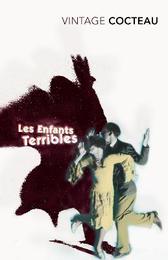
|
Les Enfants Terribles
Paperback / softback
Main Details
| Title |
Les Enfants Terribles
|
| Authors and Contributors |
By (author) Jean Cocteau
|
| Physical Properties |
| Format:Paperback / softback | | Pages:144 | | Dimensions(mm): Height 198,Width 129 |
|
| Category/Genre | Modern and contemporary fiction (post c 1945) |
|---|
| ISBN/Barcode |
9780099561378
|
| Classifications | Dewey:843.912 |
|---|
| Audience | |
|---|
|
Publishing Details |
| Publisher |
Vintage Publishing
|
| Imprint |
Vintage Classics
|
| Publication Date |
7 July 2011 |
| Publication Country |
United Kingdom
|
Description
A tragedy about the power of the imagination and the strange, claustrophobic world of childhood At home, Paul shares a private world with his sister Elisabeth, a world from which parents are tacitly excluded. Their room is where the Game is played, the Game being their own bizarre version of life. All that they do outside is effectively controlled by the rules of the Game- unfortunately the rules of the Game prescribe that the two children must die...
Author Biography
Jean Cocteau (1889-1963) - poet, novelist, dramatist, artist, musician, choreographer, film-maker, and actor - was one of the most talented Frenchmen of the twentieth century and a leading figure in the Surrealist movement. In addition to his popular novel Les Enfants terribles (1929), he is best remembered in the English-speaking world for the film of Orph-e (1950) and perhaps his play La Machine infernale (1934).
ReviewsThe lasting feeling that his work leaves is one of happiness; not of course in the sense that it excludes suffering, but because, in it, nothing is rejected, resented or regretted -- W. H. Auden Cocteau's tale of young beauties whose isolation leads them towards premature decay...a genuine tragedy * Independent on Sunday * The novel Les Enfants Terrible has become a rite of passage in every French childhood * Guardian * If La Belle et la Bete his romance, then Les Enfants Terribles is his tragedy. Like the others, it articulates Cocteau's belief in the power of imagination to transform the ordinary world into a world of magic -- Philip Glass Cocteau never meant his work to pass as anyone else's, and even when it is imitative it bears a maker's mark that would disqualify any forger: the stamp of a master of paradox and aesthetic epigram, who supplied a unique - and enduring - connection between the classic and the new -- Francis Steegmuller
|